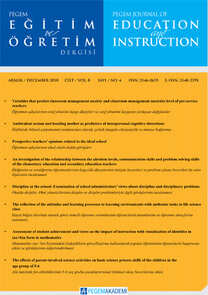Prospective English teachers' habits and perceptions of online reading
İngilizce öğretmen adaylarının çevrimiçi okuma alışkanlıklarıve algıları
___
- Aqili, N. (2010). Technology and the need for media literacy education in the twenty-first century, European Journal of Social Sciences, 15(3), 449-456.
- Brantmeier, C. (2003). Technology and second language reading at the university level: Informed instructors' perceptions. The Reading Matrix, 3(3), 50-74.
- Caverly, D.C. & Peterson, C.L. (2000). Technology in college developmental reading. In R. Flippo &D.
- Caverly (Eds.) The Handbook of College Reading and Study Strategy Research (pp.291-320).. Mahwah, N.J.: Lawrence Erlbaum Associates.
- Edem, M. & Ofre, E. (2010). Reading and internet use activities of undergraduate students of the University of Calabar, Nigeria. Africa Journal Library, Archives & Information Science,20(1), 11-18.
- Gömleksiz, M.N. Kan, A. & Öner, Ü. (2012). Gifted and talented students’ perceptions of media literacy(Case of Elazığ Science and Art Center). Pegem Journal of Education and Instruction,2(4), 41-54.
- Hagood, M.C. (2003). New media and online literacies: No age left behind. Reading Research Quarterly,38(3), 387-391.
- Leu, D. J. (2000). Literacy and technology: Deictic consequences for literacy education in an information age. In M.L. Kamil, P. Mosenthal, P.D. Pearson & R. Barr (Eds.) Handbook of reading research (pp.743-770). Mahwah, NJ: Erlbaum.
- Lui, Z. & Huang, X. (2008). Gender differences in online reading environment. Journal of Documentation, 64(4), 616-626.
- Murray, D. E. & Christison, M. A. (2011) What English Language teachers need to know: Facilitating learning. New York: Routledge/Taylor & Francis.
- Noor, N.M. (2011). Reading habits and preferences of EFL post graduates: A case study. Indonesian Journal of Applied Linguistics,1(1), 1-9.
- Shaikh, A.D. & Chaparro, B. S.(2004). A survey of online reading habits of internet users. Proceedings of the human factors and ergonomics society 48th annual meeting, 875-879.
- Shen, C. (2006). Computer technology and college students’ reading habits. Chia-nan Annual Bulletin, 32, 559-572.
- Thoman, E.,& Jolls, T. (2004). Media literacy- A national priority for a changing world. American Behavioral Scientist, 48(1), 18-29.
- Tseng, M. C. (2007). An investigation of EFL learners’ online reading skills. Journal of Nanya Institute of Technology, 27, 111-127.
- Tseng, M. C. (2008). The difficulties that EFL learners have with reading text on the web. Internet TESL Journal, 14(2). Retrieved August 10, 2013, from http://iteslj.org/Articles/Tseng- TextOnTheWeb.html.
- Tseng, M. C. (2010). Factors that influence online reading: An investigation into EFL students' perceptions. The Reading Matrix, 10(1), 96-105.
- ISSN: 2146-0655
- Yayın Aralığı: 4
- Başlangıç: 2011
- Yayıncı: Pegem Akademi Yayıncılık Eğitim Danışmanlık Hizmetleri Tic. Ltd. Şti.
Prospective English teachers' habits and perceptions of online reading
MUSTAFA NACİ KAYAOĞLU, Raşide AKBAŞ DAĞ
Opinions of classroom teachers' about the vocabulary teaching in Turkish course
HÜSEYİN ANILAN, Berrin ERSOY GENÇ
Factors related with students’ foreign language achievement
SİNEM VATANARTIRAN, Gülay DALGIÇ, Şirin KARADENİZ
BÜNYAMİN AĞALDAY, Habib ÖZGAN, Mustafa Cüneyt ARSLAN
Analysis of keywords used in environmental education research
Esra Kızılay, Mustafa HAMALOSMANOĞLU, Zehra KAPLAN, Serdar VARİNLİOĞLU
